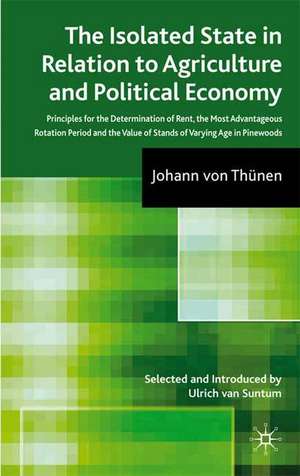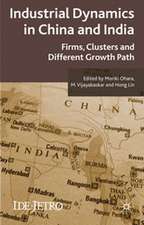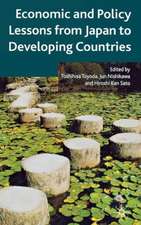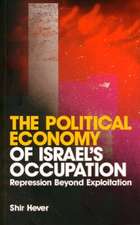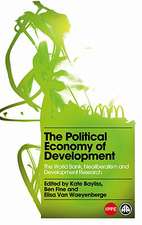The Isolated State in Relation to Agriculture and Political Economy: Part III: Principles for the Determination of Rent, the Most Advantageous Rotation Period and the Value of Stands of Varying Age in Pinewoods
Autor Johann von Thünen Editat de Kenneth A. Loparoen Limba Engleză Hardback – 29 mai 2009
Preț: 382.95 lei
Nou
Puncte Express: 574
Preț estimativ în valută:
73.28€ • 76.86$ • 61.00£
73.28€ • 76.86$ • 61.00£
Carte tipărită la comandă
Livrare economică 01-15 aprilie
Preluare comenzi: 021 569.72.76
Specificații
ISBN-13: 9780230222519
ISBN-10: 023022251X
Pagini: 139
Ilustrații: XX, 139 p.
Dimensiuni: 140 x 216 x 13 mm
Greutate: 0.3 kg
Ediția:2009
Editura: Palgrave Macmillan UK
Colecția Palgrave Macmillan
Locul publicării:London, United Kingdom
ISBN-10: 023022251X
Pagini: 139
Ilustrații: XX, 139 p.
Dimensiuni: 140 x 216 x 13 mm
Greutate: 0.3 kg
Ediția:2009
Editura: Palgrave Macmillan UK
Colecția Palgrave Macmillan
Locul publicării:London, United Kingdom
Cuprins
Preface; P.A.Samuelson Foreword to the English Translation; F.Tack Johann Heinrich von Thünen's Contribution to the Forestry Economics: A Brief Introduction to Part III of the Isolated State; U.van Suntum PART I: Timber Yield Timber Value The Determination of the Value of Pinewood Stock of a Given Age The Determination of the Value of Timber Stocks of Differing Rotation Periods The Rent of the Woodland Floor Calculations Related to the Rotation Period Thinning Out The Rent of Woodland in Comparison with Ground Rent Underwood or Brushwood The Influence of the Yield in Value of Thinnings on the most Advantageous Rotation Period and on Ground Rent The Thinning Methods Employed by Chief Forester Nagel Ground Rent and Rotation Period from Pollination, if Thinning Removes Half the Wooded Growth Comparison of the Two Methods, in Which Thinning Removes A. One Third of Annual Timber Growth, B. Half of this Growth PART II: How Great Does the Space Around each Tree Need to be in Relation to its Diameter if the Annual Growth in Value of the Entire Woodland is to Achieve a Maximum? The Growth of Individual Trees in Diameter and in Physical Volume Calculation of the Portion of the Growth to be Removed in Thinning Criticism Ground Rent and the Most Advantageous Rotation Period, if Only 1/3 of the Growth is Left in the Remaining Stock PART III: What is the Relationship Between the Growth of the Tree and the Space Which Each Tree Has? Calculation of Total Growth Ground Rent and Most Advantageous Rotation Period for Different Degrees of Distance of Trees from One Another What Part of the Timber Reserve is at Different Ages Removed in Decennial Thinnings? Deviation of the Results of Our Calculation from Reality Comparison of the Ground Rent of Woodland With That of Arable Land Applications Continuation Epilogue: A Chronicle of Editing the Isolated State; R.Schwarze Glossary
Notă biografică
JOHANN HEINRICH VON THÜNEN (1783-1850) was a prominent nineteenth-century economist, who is credited with a number of important anticipations of modern economic theory, such as the concepts of economic rent, diminishing returns, and marginal productivity. For the most of his life Thünen worked in isolation on his agricultural estate, Tellow, in Mecklenburg. According to Nobel Prize winner Paul Samuelson, Thünen 'belongs in the Pantheon with Leon Walras, John Stuart Mill, and Adam Smith'. Both the Tellow estate and Thünen`s grave, which has his famous formula for the natural wage engraved on it, can still be visited today.
ULRICH VAN SUNTUM is Professor of Economics at the Muenster University in Germany. He was formerly secretary general of the German Council of Economic Advisors and is engaged in both economic research and policy advice. His preferred areas of research are capital theory, labour economics, history of economic thought, and regional and housing economics. He has written several articles on Johann Heinrich von Thünen, both in German and in English.
ULRICH VAN SUNTUM is Professor of Economics at the Muenster University in Germany. He was formerly secretary general of the German Council of Economic Advisors and is engaged in both economic research and policy advice. His preferred areas of research are capital theory, labour economics, history of economic thought, and regional and housing economics. He has written several articles on Johann Heinrich von Thünen, both in German and in English.
